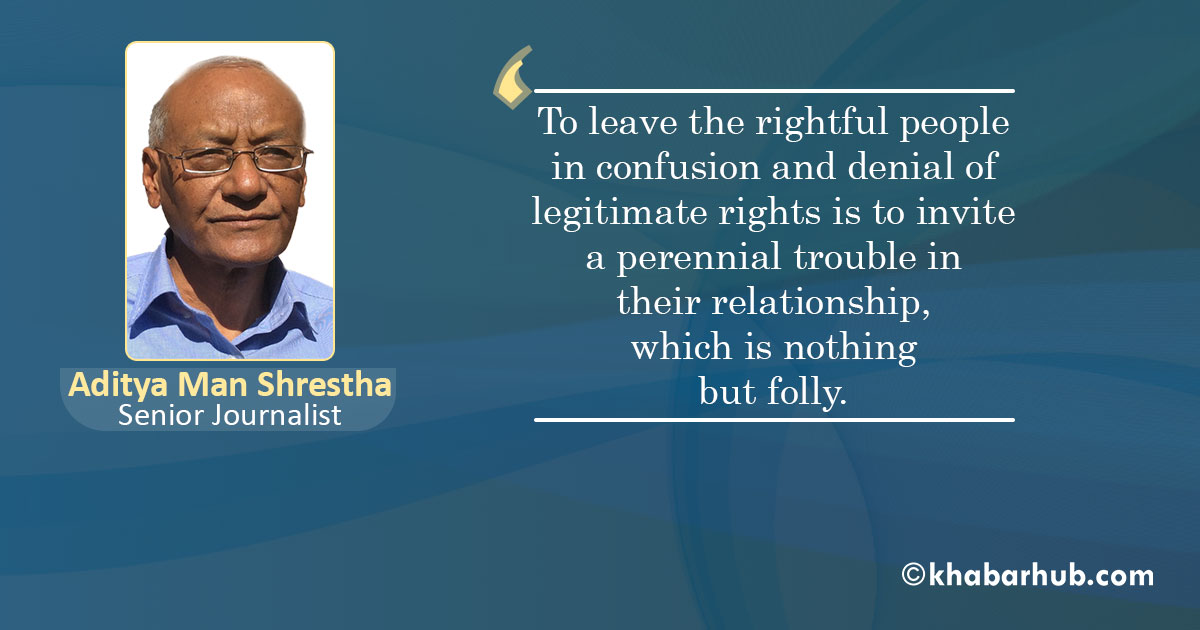It sounds incredible to hear that the Nepalese are hurting the Nepalese. It is tragic, to say the least if they are doing so. In fact, they are doing so. It is all the more tragic to know that such an undesirable and unthinkable thing is happening right under our nose. It is none other than the Nepalese who visit India for a short or long period of time are believed to have done so. Those Nepalese who travel to India are alleged to have hurt the Nepalese who have long settled down in India as citizens of India.
Indian officials take the liberty to mix them up with the recent visitors whenever there is an opportunity to provide occasional relief or regular facilities to Indian citizens including those of Nepalese origin. There are hundreds of thousands of people of Nepalese origin, who have been living in India as Indians but get maltreated as temporary Nepalese visitors and denied the right to privileges they deserve as Indian citizens. In other words, they get deprived of their due simply because they get identified with the temporary visitors from Nepal, who have no claim over the services Indian government or other agencies extend to their citizens.
This has been amply highlighted by none other than an eminent Indian scholar of Nepalese origin, Prof. Mahendra Lama of Jawaharlal Nehru University. He has rightfully pointed out two reasons for this unwanted anomaly in the status and position of Nepalese in India. The open border that exists between Nepal and India and the treaty of 1950 that provides overall guidance to the bilateral relations. Under these two conditions, people of Nepal and India are freely allowed to visit each other’s country without visa, passport or identity papers.
That, however, does not grant equal status and privileges to the temporary visitors and permanent migrants in India. Nepalese people belonging to places like Darjeeling and Dehradun turned Indians when Nepal lost these territories in the Nepal-British India war of 1814-16. Nepal ceded large chunk of its territory to British India under the Sugauli Treaty that was concluded after that historic war. Similarly, for hundreds of years, people from Nepal have been migrating to difficult areas of India and settled down there as Indian citizens. However, all of them are vulnerable of being dubbed by the Indian officials as recent migrants from Nepal and face getting evicted from their homes and land. They generally do not possess any official papers like the Nepalese citizenship certificates because the Indian government has no practice of granting such a paper to its citizens.
Prof. Lama has cited the instances of 1980 and 1990 when settlers from Nepal for over 150 or 200 years were evicted from their homeland. They had to undergo this unjustified misery simply because there was no way they could prove different from the recent migrants from Nepal. It is all the more disheartening to find the Indians of Nepalese origin denied of relief from the Indian government at times of natural disasters like the disastrous earthquake in Gujarat, massive flood and landslides in Uttarakhand and destruction wrought by incessant rains in Meghalaya.
Of all the adverse conditions, the Indians of Nepalese origin feel hurt in establishing their identity. They feel they have not been able to assert their Indian identity, Indian nationality, and Indian citizenship simply because the Nepalese of Nepal intervene by their free movement and presence in India. They want to possess separate identity and status in India, which they legitimately deserve, from those who come from Nepal to India for different reasons.
Similar grievances exist in Nepal when it comes to the question of Indian migrants to Nepal. When the natural barriers of thick forest, wild animals and endemic malaria disappeared from Nepal post-1950 political change-over, people from India made a big inroad into Nepal primarily for better opportunities than those existing in their environment in India.
There were even those Indians who had settled down in Nepalese soil for generations despite the difficult climatic and living conditions. The flow of migrants from India went on growing as they found the fertile land of Nepal more yielding, petty businesses more profitable and trading opportunity more conducive. When the population of Indian origin grew big enough to make an impact in the Tarai areas, it adopted a political color that is still bothering the Nepali polity.
However, a parallel situation like that of India in relation to people of Nepalese origin has emerged in Nepal pertaining to the people of Indian origin in Nepal. Those who have adopted Nepali nationality and citizenship in course of their long sojourn are getting hurt by those who are recent migrants from India and most vociferous in asserting their rights they do not deserve. For instance, Nepalese accepted with pleasure two native persons from that community as the President and Vice-President but resisted the newly arrived migrants from getting access to such high positions.
To make matter simple and sustainable, the identity of the Indians of Nepalese origin and the Nepalese of Indian origin must be established by all means to let them enjoy their life and political rights. To create a congenial atmosphere for it, the open border must be regulated. That does not interrupt the free movement of the people from these countries crossing the border. To leave the rightful people in confusion and denial of legitimate rights is to invite perennial trouble in their relationship, which is nothing but folly.
Views expressed in this article are the author’s own and do not necessarily reflect the stance of Khabarhub.









Comment